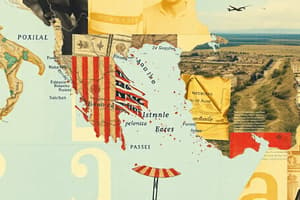Podcast
Questions and Answers
What is the geographical location of Greece?
What is the geographical location of Greece?
- In the Northern Mediterranean, near France
- In the Western Mediterranean, near Spain
- In the Eastern Mediterranean, between Italy and Turkey (correct)
- In the Central Mediterranean, near North Africa
Why did Greece become a crossroads for the Mediterranean world?
Why did Greece become a crossroads for the Mediterranean world?
- Because of its unique culture
- Because of its powerful military
- Because of its vast natural resources
- Because of its strategic location in the Eastern Mediterranean (correct)
What was the result of Greece's interactions with foreign powers and cultures?
What was the result of Greece's interactions with foreign powers and cultures?
- The creation of a weak and divided society
- The formation of a powerful and isolated empire
- The destruction of native Greek cultures
- The development of a culture that greatly influenced the Western world (correct)
What was the natural point for trading vessels traversing the seas?
What was the natural point for trading vessels traversing the seas?
Why did the Greeks have to interact with the sea from their earliest period?
Why did the Greeks have to interact with the sea from their earliest period?
What is the result of Greece's mountainous terrain?
What is the result of Greece's mountainous terrain?
What is the characteristics of Greece's landscape?
What is the characteristics of Greece's landscape?
What made the seas off the Greek islands among the richest fishing grounds in the ancient world?
What made the seas off the Greek islands among the richest fishing grounds in the ancient world?
What was a consequence of the hilliness of Greece's terrain?
What was a consequence of the hilliness of Greece's terrain?
Why could Greek farmers focus on growing certain crops?
Why could Greek farmers focus on growing certain crops?
What was a result of the mountainous nature of ancient Greece?
What was a result of the mountainous nature of ancient Greece?
What was a key factor in the Athenians' control of the Aegean Sea?
What was a key factor in the Athenians' control of the Aegean Sea?
Why were land battles in ancient Greece often fought by foot soldiers?
Why were land battles in ancient Greece often fought by foot soldiers?
What was a challenge for ancient Greek farmers?
What was a challenge for ancient Greek farmers?
What determined the location of many Greek colonies?
What determined the location of many Greek colonies?
Flashcards
Greece's location
Greece's location
Eastern Mediterranean, between Italy and Turkey
Greece as a crossroads
Greece as a crossroads
Its central position in the Eastern Mediterranean
Impact of Greece's interactions
Impact of Greece's interactions
A culture that greatly influenced the Western world
Natural point for trade
Natural point for trade
Signup and view all the flashcards
Reason for sea interaction
Reason for sea interaction
Signup and view all the flashcards
Result of mountainous terrain
Result of mountainous terrain
Signup and view all the flashcards
Greece's landscape
Greece's landscape
Signup and view all the flashcards
Rich fishing grounds
Rich fishing grounds
Signup and view all the flashcards
Consequence of hilliness
Consequence of hilliness
Signup and view all the flashcards
Farmers crop focus
Farmers crop focus
Signup and view all the flashcards
Result of mountainous nature
Result of mountainous nature
Signup and view all the flashcards
Athenian Aegean control
Athenian Aegean control
Signup and view all the flashcards
Land battles by foot soldiers
Land battles by foot soldiers
Signup and view all the flashcards
Challenge for Greek farmers
Challenge for Greek farmers
Signup and view all the flashcards
Greek colony locations
Greek colony locations
Signup and view all the flashcards
Study Notes
Location of Greece
- Greece is an archipelago and a peninsula located in the Eastern Mediterranean, between Italy and Turkey, and is the southernmost tip of the Balkan Peninsula.
- Its unique location has made it a crossroads for the Mediterranean world since ancient times.
Influence of Location on Greek Culture
- The location has led to influences from foreign powers and cultures being part of the Greek experience.
- The Greeks had to create a culture that was powerful enough to influence the Western world.
Landforms of Greece
- Greece is extraordinarily mountainous, making it difficult to sustain large societies based on agriculture.
- The mountains made trade and fishing essential for a food supply.
- The sea provided rich fishing grounds, allowing Greece to feed itself and trade excess.
Agriculture in Greece
- The hills are fertile for certain cash crops, making olive orchards and vineyards possible.
- Olive oil and wine were easily exported throughout the known world.
- Greek farmers focused on growing crops that succeeded in Greece's terrain, rather than trying to grow grains.
Geopolitics in Ancient Greece
- The mountains made communication on the Greek mainland difficult, leading to the development of city-states.
- City-states often formed alliances with certain states against others.
- Sea battles were crucial in Greek wars, while land battles were fought primarily by foot soldiers.
Greek Climate
- Greece has no major river systems, relying on rainfall to keep orchards and vineyards fertile.
- The warm sea breezes made life in city-states tolerable.
- Coastal regions were preferred, with inland areas being seen as less desirable.
Studying That Suits You
Use AI to generate personalized quizzes and flashcards to suit your learning preferences.




